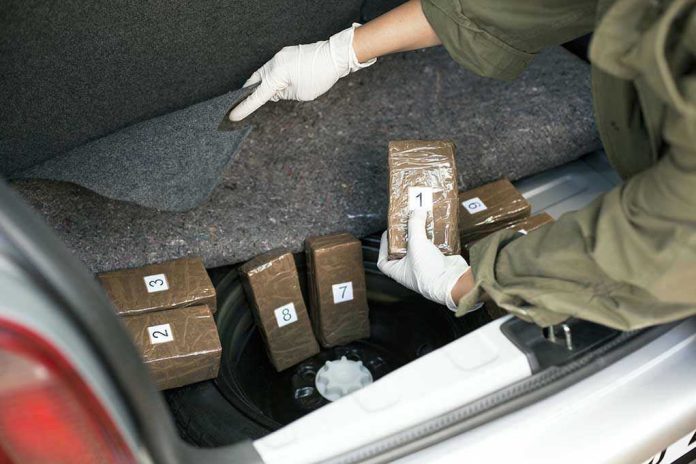
A sweeping crackdown on illegal immigration and cartel-linked crime is reshaping law enforcement nationwide, delivering on promises to defend American communities and conservative values.
Story Snapshot
- DEA arrests 27 in Franklin, NH, exposing Sinaloa Cartel’s reach into rural New England.
- Trump administration’s tough new policies sharply reduce illegal border crossings.
- Major expansion of immigration detention and enforcement, including family detention.
- Local-federal partnerships intensify to combat cartel infiltration and drug trafficking.
Federal Drug Sweep Reveals Cartel Threat on American Soil
On August 26-27, 2025, federal agents and Franklin, NH police arrested 27 individuals linked to the notorious Mexican Sinaloa Cartel in a coordinated operation. Authorities seized large quantities of fentanyl and methamphetamine, plus cash and firearms, underscoring the severity of the opioid crisis impacting rural communities. This action demonstrates how international criminal organizations now exploit local networks, threatening safety and stability not only in border states but deep into small-town America.
Investigators had spent three months tracking drug activity, with Lawrence, Massachusetts serving as a key transit hub for narcotics entering New Hampshire. The Sinaloa Cartel’s involvement highlights evolving tactics, including partnerships with Chinese groups to import precursor chemicals for synthetic drugs. Law enforcement stressed the operation’s scale and the importance of disrupting these networks before further harm could reach families and neighborhoods. The arrests mark a significant victory for coordinated federal-local policing, sending a clear message that cartel influence will not be tolerated.
Trump’s Immigration Crackdown: Policy Shifts and Community Impact
Since President Trump’s return to office in January 2025, a series of executive orders have redefined America’s approach to immigration and border security. These measures include declaring a national emergency at the southern border, blocking asylum seekers, ending “catch and release,” and sharply restricting birthright citizenship for non-permanent residents. Trump signed the Laken Riley Act, mandating detention for immigrants charged or convicted of crimes, while designating cartels as terrorist organizations. These actions have driven illegal border crossings to their lowest levels in decades, fulfilling conservative demands for real enforcement and the protection of American sovereignty.
The administration has expanded the use of facilities like Guantanamo Bay to house migrants awaiting deportation, and bolstered cooperation between federal, state, and local law enforcement. The Department of Homeland Security’s budget for detention and enforcement has more than quadrupled, funding the detention of adults and families and enabling indefinite detention for children—a move critics argue violates established legal protections. For many readers, these bold steps answer years of frustration over government inaction, restoring a sense of control and security to communities threatened by unchecked migration and criminal networks.
Local-Federal Partnerships: Defending Constitutional and Family Values
Project 2025 and related initiatives now entangle local police departments in federal immigration enforcement, penalizing communities that refuse to cooperate. Law enforcement agencies gain expanded authority to access databases and deputize officers for immigration raids, sometimes overriding state and local resistance. For conservative Americans, these policies represent a return to prioritizing the Constitution, gun rights, and traditional principles. By cracking down on drug traffickers and illegal immigrants, authorities aim to stem the erosion of family values and reduce the economic, social, and political burdens caused by leftist overspending and globalist agendas.
27 ARRESTED
Major Drug Trafficking BUST
Pics: 27 arrested in major drug trafficking bust in New Hampshire https://t.co/3VIySJJZhu
— Williams Kris (@kris_willi28289) August 29, 2025
However, experts and public health officials caution that enforcement alone may not fully resolve the opioid crisis or reduce overdose deaths without complementary strategies for addiction treatment and prevention. While community leaders hail the arrests in Franklin as a necessary response to cartel infiltration, others warn of unintended consequences—such as the displacement of trafficking routes or increased incarceration rates. The Trump administration’s policies and the DEA’s operation in New Hampshire highlight both the effectiveness and complexity of defending American communities against international threats in an era of heightened law enforcement.
Sources:
27 people charged in DEA drug sweep in Franklin
27 arrested by feds in fentanyl, meth bust tied to Mexican cartel



